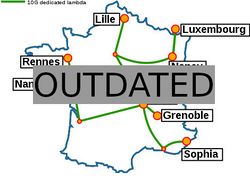Grid5000:Home: Difference between revisions
No edit summary |
No edit summary |
||
| Line 29: | Line 29: | ||
<br> | <br> | ||
== Random pick of publications == | |||
{{#publications:}} | {{#publications:}} | ||
Revision as of 13:49, 23 March 2018
|
Grid'5000 is a large-scale and versatile testbed for experiment-driven research in all areas of computer science, with a focus on parallel and distributed computing including Cloud, HPC and Big Data. Key features:
|
Random pick of publications
Five random publications that benefited from Grid'5000 (at least 2517 overall):
- Mehmet Ali Tugtekin Turan, Dietrich Klakow, Emmanuel Vincent, Denis Jouvet. Adapting Language Models When Training on Privacy-Transformed Data. LREC 2022 - 13th Language Resources and Evaluation Conference, Jun 2022, Marseille, France. hal-03189354v2 view on HAL pdf
- Igor Fontana de Nardin, Patricia Stolf, Stéphane Caux. Evaluation of Heuristics to Manage a Data Center Under Power Constraints. 13th International Green and Sustainable Computing Conference (IGSC 2022), Oct 2022, Pullman, United States. 10.1109/IGSC55832.2022.9969362. hal-03841713 view on HAL pdf
- Shakeel Sheikh, Md Sahidullah, Fabrice Hirsch, Slim Ouni. Robust Stuttering Detection via Multi-task and Adversarial Learning. EUSIPCO 2022 - 30th European Signal Processing Conference, Aug 2022, Belgrade, Serbia. hal-03629785 view on HAL pdf
- Sirine Sayadi. Architectures réparties et conteneurs logiciels sécurisés pour coopérations médicales multi-sites. Calcul parallèle, distribué et partagé cs.DC. Ecole nationale supérieure Mines-Télécom Atlantique, 2022. Français. NNT : 2022IMTA0331. tel-03922210 view on HAL pdf
- Quentin Guilloteau, Bogdan Robu, Cédric Join, Michel Fliess, Éric Rutten, et al.. Model-free control for resource harvesting in computing grids. CCTA 2022 - Conference on Control Technology and Applications, CCTA 2022, Aug 2022, Trieste, Italy. 10.1109/CCTA49430.2022.9966035. hal-03663273v2 view on HAL pdf
Latest news
Failed to load RSS feed from https://www.grid5000.fr/mediawiki/index.php?title=News&action=feed&feed=atom: Error parsing XML for RSS
Grid'5000 sites
Current funding
As from June 2008, Inria is the main contributor to Grid'5000 funding.
INRIA |
CNRS |
UniversitiesUniversité Grenoble Alpes, Grenoble INP |
Regional councilsAquitaine |


